
|
IN THIS PHOTO:
|
|
.
. |
| View Gallery |
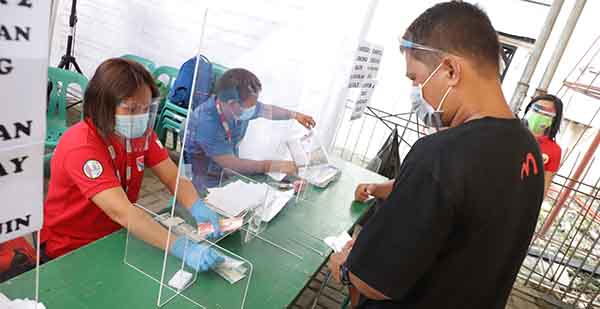
|
IN THIS PHOTO:
|
|
.
. |
| View Gallery |
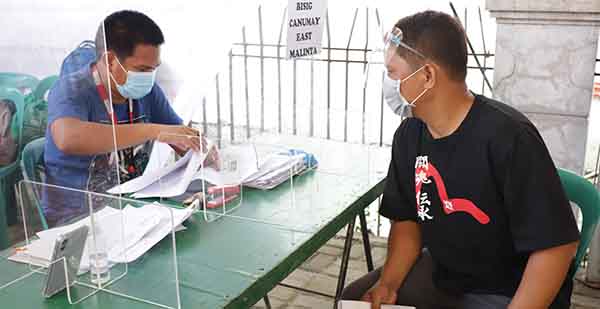
|
IN THIS PHOTO:
|
|
.
. |
| View Gallery |
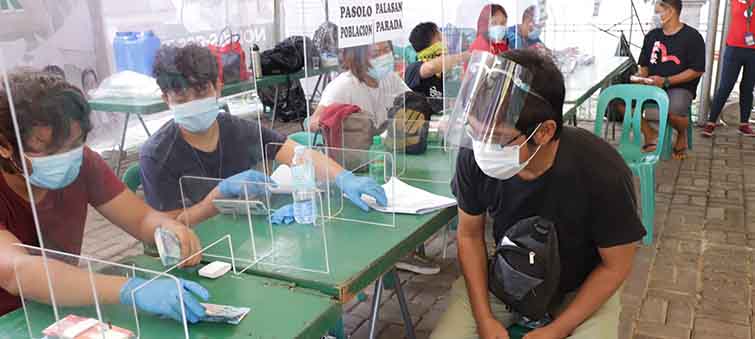
|
IN THIS PHOTO:
|
|
.
. |
| View Gallery |
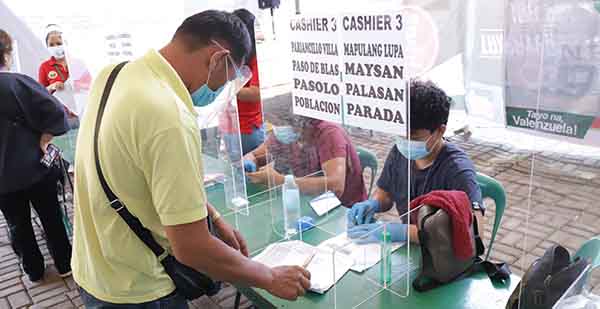
|
IN THIS PHOTO:
|
|
.
. |
| View Gallery |
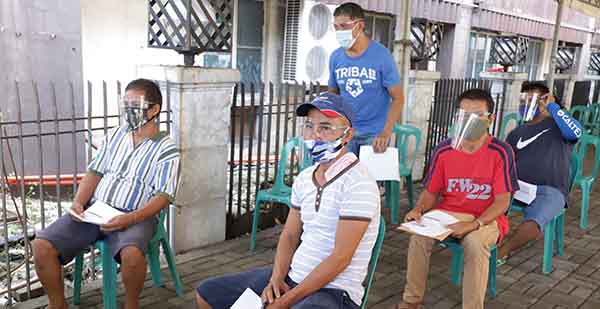

To ensure that they will be able to provide their families’ needs amid their still suspended operations and the extended General Community Quarantine (GCQ), a total of 869 jeepney operators and drivers from Valenzuela City were temporarily employed from August 20-29, 2020 through the Department of Social Welfare and Development Office (DSWD)’s Cash-for-Work Program.
As stipulated in the Guidelines for the Implementation of the Cash-for-Work Project or DSWD Administrative Order 15, the project shall serve as a “short-term intervention to provide temporary employment to distressed/displaced individuals by participating in or undertaking preparedness, mitigation, relief, rehabilitation or risk reduction projects and activities in their communities or in evacuation centers.”
The program may also be carried out before, during, or after the occurrence of a natural or man-made calamity wherein participants will be compensated in cash for the service they rendered, which, in turn, they can use for the purchase of the basic needs of their respective families.
During the 10-day program facilitated by the City Social Welfare and Development Office (CSWDO), the members of seven (7) Valenzuela City-recognized jeepney operators and drivers associations (JODAs) were deployed to their assigned barangays to do community service.
For a full day’s work, which involves street sweeping and creek and canal declogging, a participant receives Php 500 or a total of Php 5,000 for the entire 10-day work assignment. The three-day payout being conducted at the ALERT Center’s Multi-purpose Building site concludes on September 4, 2020.
Together with some 631 members of an urban poor group and solo parents from the City, the JODA members completed this year’s roster of Cash-for-Work beneficiaries. Among the recipients were the operators and members of the Karuhatan-T. de Leon-Ugong Jeepney Operators and Drivers Association (KARTUJODA), Malinta-Valenzuela-Novaliches Operators and Drivers Association, Inc.(MAVANODA), Malanday-Polo-Paco Operators and Drivers Association, Inc. (MVBJODA), Meycauayan-Lawang Bato-Punturin-Bignay Jeepney Operators and Drivers Association, Inc. (MELAPBJODA), Alliance-Valenzuela-Meycauayan Jeepney Operators and Drivers Association, Inc. (AVAMEJODA), Malinta-Caloocan-Novaliches Jeepney Operators and Drivers Association, Inc. (MACANOJODA), and the Novaliches-Malinta Jeepney Transport Service Cooperative (NMJTSC).
Drivers’ dilemma
Back in mid-March, operations of all types of public transportation including public utility jeepneys (PUJs) were put on hold as the entire Metro Manila was placed under Enhanced Community Quarantine (ECQ) due to the outbreak of the corononavirus disease (COVID-19). The lockdown rendered an estimated 70,000 drivers jobless.
It was only on June 22 when modern jeeps or e-jeeps were allowed to return to the streets as the region slid to a more relaxed General Community Quarantine (GCQ). Beginning July 3, additional traditional jeepneys considered as “roadworthy” were permitted to ply their routes.
Of the 49 approved Metro Manila routes, only the jeepneys traversing the Karuhatan-Ugong route was granted permission to operate again in Valenzuela City, provided that operators and drivers observed the minimum health standard protocols set by the Inter-Agency Task Force (IATF) for the Management of Emerging Infectious Diseases.
Last August 26, the Bagbaguin-Malinta route was added to the 23 routes authorized to resume operations.
As only a limited number of traditional jeepneys are allowed to operate within the metro, quite a number of traditional jeepney drivers have already resorted to begging on the streets just so they could put food on their tables.
Fortunately, the City Government of Valenzuela heeded to the need to provide food packs for JODA members. In June alone, there have been four (4) waves of food pack distribution among the seven (7) JODAs with terminals in the City.
The struggle is real
Rogelio Simangan, 41, a MAVANODA driver for almost 15 years recounts his lockdown experiences, “Mahirap po. Mahirap ang buhay namin dahil hindi po kami nakakabiyahe. Una sa lahat, wala rin kaming mapasukan na ibang trabaho. Kung mayroon man, bihira lang. Minsan po, ‘pag may nagpapagawa po sa amin ng bahay, pumapasok po ako bilang laborer. ‘Yung asawa ko, sa bahay lang po. Ako lang ang lumalabas [para magtrabaho].”
As a father to three (3) young children aged 15, 12, and 1 year old, Mang Rogelio recalls that one of the toughest challenges he encountered during the lockdown was making sure that his youngest child has ample milk supply.
“Kung sa pagkain naman po, kaya ko naman pong [gawan ng paraan]. Kasi minsan humihingi ako ng tulong sa mga ate ko. Binibigyan po nila ako kahit papano — bigas, mga de lata, at sardinas. ‘Yung gatas lang po talaga ng anak ko ang importante,” he shares.
But despite the difficult times, Mang Rogelio remains grateful, “Nagpapasalamat po ako kay Mayor REX para sa Cash-for-Work. Malaking bagay po ang natanggap ko... Dahil kahit papaano po, mayroon na akong pampagatas sa anak ko at panggastos sa bahay.”
With almost half a year into the lockdown, Mang Rogelio can only pray for brighter days ahead. “Sana po, ‘yun pong problema natin sa pandemic magwakas na at tuloy-tuloy na ang hanapbuhay namin,” he muses.
Transition to modernization
On June 10, Mayor REX called for a dialogue with the members of the City’s JODAs together with Transportation Office Head Mr. Jay Valenzuela, Cooperative Development Office (CDO) Head Ms. Josephine Osea, and Committee Member on Public Utilities and Facilities and District 1 Councilor Ghogho Deato-Lee, to broach the idea of the Public Utility Vehicle Modernization Program (PUVMP).
The City Mayor assured the operators and drivers of the City’s help in the registration process once they decide to form transportation cooperatives.
Ms. Osea was tasked to assist the JODAs in their transition to modernization. On June 18, the Cooperative Development Authority (CDA) held the first online Pre-Registration Seminar (PRS). It was followed by a series of Cooperative Education Transport Operation Seminars (CETOS) conducted by the Office of Transportation Cooperative (OTC) on July 10, 13, and 17. Ending the virtual seminar series was another CDA PRS on August 7.
Two (2) new cooperatives, the Malanday Valenzuela Transport Service Cooperative and the Valenzuela Bignay Transport Service Cooperative, attended the seminars as a requirement for the registration process.
Currently, the CDO is in close coordination with these cooperatives as they draft the Articles of Coordination and Bylaws and prepare the documents required by the Land Transportation Franchising and Regulatory Board (LTFRB) for the consolidation of the routes of the new franchisees.
 Latest News
Latest News Archive
Archive Category
Category

